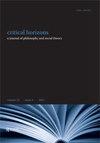The Cruel and Benevolent Knife: Hannah Arendt’s Critique of Compassion in Politics
IF 0.4
Q3 SOCIAL SCIENCES, INTERDISCIPLINARY
引用次数: 0
Abstract
ABSTRACT What is the place of compassion in politics? For Hannah Arendt, compassion – a natural fellow-feeling for a suffering other – cannot be brought into politics without damaging both the feeling and the political realm. Arendt develops this analysis in the context of her critique of the French revolution, particularly its Jacobin episode. According to Arendt, the Jacobins attempted to keep the revolution’s compass fixed on unanimity and social cohesion by deploying a discourse of compassion. My reconstruction of Arendt’s argument in On Revolution looks at how the Jacobins’ moralisation and politicisation of compassion not only destroyed the nascent space of politics in the revolution but introduced new ways of justifying cruelty. I go on to show the role that Jacobin compassion has played in the revolutionary tradition more broadly. Read thus, Arendt’s critique is not limited to the French revolution but targets a possibility that is present within the political culture of modernity – one that is activated whenever public action becomes equated with displaying virtuous pity for suffering groups.残忍而仁慈的刀:汉娜·阿伦特的政治同情批判
同情在政治中的地位是什么?对汉娜·阿伦特来说,同情心——一种对受苦的他人的自然的同道之情——不可能在不损害情感和政治领域的情况下被带入政治。阿伦特在她对法国大革命的批判中发展了这种分析,尤其是在雅各宾派时期。根据阿伦特的说法,雅各宾派试图通过部署同情的话语,将革命的指南针固定在一致和社会凝聚力上。我在《论革命》中对阿伦特的论述进行了重构,探讨了雅各宾派对同情的道德化和政治化如何不仅摧毁了革命中政治的新生空间,而且引入了为残忍辩护的新方法。我将继续展示雅各宾派的同情心在革命传统中所扮演的角色。因此,阿伦特的批判并不局限于法国大革命,而是瞄准了现代性政治文化中存在的一种可能性——只要公共行动等同于对受苦群体表现出善良的同情,这种可能性就会被激活。
本文章由计算机程序翻译,如有差异,请以英文原文为准。
求助全文
约1分钟内获得全文
求助全文

 求助内容:
求助内容: 应助结果提醒方式:
应助结果提醒方式:


